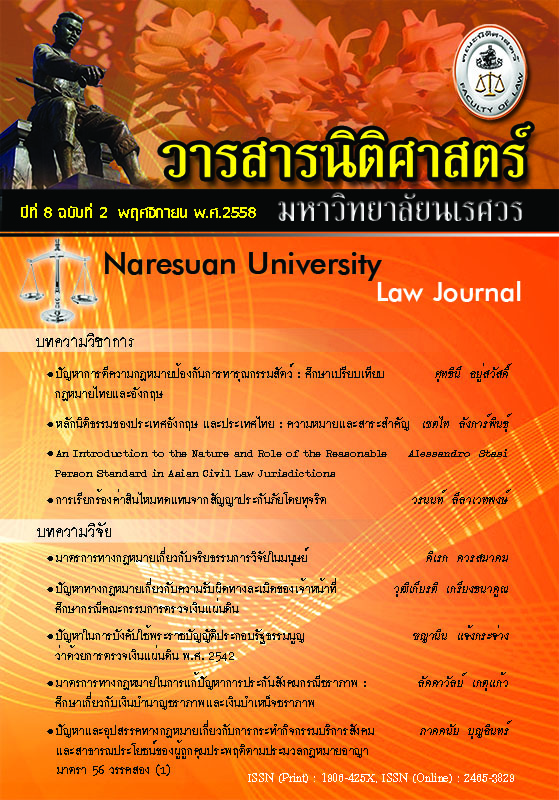Legal Measure Concerning on Research Ethics in Human
Main Article Content
Abstract
This research was conducted to study the concepts of ethics and ethics in human as well as legal measures for the control of the research in human. Moreover, it was to study the problems of research in human and other legal measures concerning the research in human. This study was considered the qualitative study with data obtained from documents, interviews, and questionnaires used in analyzing the descriptive contents under the specified scope of extent. The research results found that western ethics referred to the principles of conduct or social patterns focusing on external behaviors. Alternatively, religious ethics referred to the proper way of life in compliance with Dhamma covering the whole life including physical, mental, and intellectual aspects. In fact, the research ethics in human began with oneself experiments. Later, there was some research regardless of human dignity and violations of the rights to physical life of the subjects. Therefore, some fundamental regulations were formulated. These included Nuremberg Code and other regulations associated with research ethics in human such as Helsinki Declaration, Belmont Report, guidelines on the biomedical science research by Council for International Organization of Medical Sciences (CIOMS), and World Health Organizations Good Clinical Practice Guidelines (WHO GCP). In this regard, most guidelines served as the ethics for the medical science research but they were not practically regarded as laws due to no punishments. The legal measures concerning research in human in Thailand were contained in several legal issues such as Thailand’s constitution in favor of protection of human dignity along with personal rights and freedoms, Civil and Commercial Codes regarding torts, Criminal Codes concerning the physical body, life, and other rights, including rights to reputation and secret disclosures, and Medical Profession Act B.E.2525 with regard to the research in human performed by physicians, which allowed the research in human only if it was ethically approved by the assigned committee whereas any failure to observe the regulations was against the medical ethics. Other laws were National Health Promotion Act B.E.2550 and Mental Health Act B.E.2551. However, there were no laws directly governing the research done in human. The problems of research in human obtained from questionnaires and interviews were as the followings; 1) Attitudes and misunderstanding of researchers toward the research in human as they thought it was complicated with many procedures and consumed a lot of time before an approval for the research process, particularly the research of social sciences and humanities; 2) A lack of supports from the authorities or institutions as their executives did not realize the importance together with no preparation for appointing the ethics committee in several universities; 3) A shortage of personnel with knowledge to serve as the ethics committee for the research in human, especially the research of social sciences and humanities which were different from others of medical sciences found with more progress; 4) No direct laws to control the research in human as there were no laws to be enforceable on this subject matter. It was aimed to protect the rights of research participants and effectively manage the monitoring process of the research in human. Even though the bill concerning the research in human is being proposed, some interesting points which might cause the problems are whether the definition of “research in human” will cover all the fields of research for both medical sciences and social sciences and humanities or not. Moreover, if the research is considered the research in human, an approval granted by the research ethics committee in the institution is required. No compliance with the regulations will result in a high degree of punishments; one-month imprisonment or penalty not exceeding 200,000 Baht or both of them. Subject to appointment of the ethics committee in several institutions, it can be conducted only if such institutions have no commercial objectives and no conflict of interest regarding the research in human or hostility against the safety protection of research participants; 5) With respect to the problem of consideration on the research project in human and animal by only one group of ethics committee, it is suggested that each group of ethics committee for the research in human and animal be separated. The researcher therefore provides several suggestions to the institutions or authorities concerning the research in human.
Article Details
References
ชัยรัตน์ ฉายากุล และคณะ. จริยธรรมทางการแพทย์. กรุงเทพฯ: วิญญูชน, 2555.
ดิเรก ควรสมาคม. คำอธิบายหลักวิชาชีพนักกฎหมาย. พิมพ์ครั้งที่ 2. กรุงเทพฯ: วิญญูชน, 2556.
ธาดา สืบหลินวงศ์. แนวทางจริยธรรม การทำวิจัยในคนในประเทศไทย พ.ศ. 2550. กรุงเทพฯ: โรงพิมพ์แห่งจุฬาลงกรณ์มหาวิทยาลัย, 2551.
บรรเจิด สิงคะเนติ. หลักการพื้นฐานเกี่ยวกับสิทธิเสรีภาพและศักดิ์ศรีความเป็นมนุษย์. พิมพ์ครั้งที่ 4. กรุงเทพฯ: วิญญูชน, 2550.
พระพรหมคุณาภรณ์ (ป.อ.ปยุตฺโต). การศึกษากับการวิจัย เพื่ออนาคตของประเทศไทย: ปาฐกถาในการประชุมวิชาการประจำปี 2538 ของสำนักงานกองทุนสนับสนุนการวิจัย (สกว.). นครปฐม: วัดญาณเวศกวัน, 2538.
พระพรหมคุณาภรณ์ (ป.อ.ปยุตฺโต). จะศึกษาพระไตรปิฎกกันอย่างไร (ช่วงที่ 1) : ธรรมบรรยายชุดหลักพุทธศาสนาต้องศึกษาให้ชัด (เครื่องบันทึกเสียง). นครปฐม.: วัดญาณเวศกวัน, 2543.
แสวง บุญเฉลิมวิภาส (บรรณาธิการ). นิติเวชศาสตร์และกฎหมายการแพทย์. กรุงเทพฯ: วิญญูชน, 2555.
แสวง บุญเฉลิมวิภาส. “กฎหมายและปัญหาจริยธรรมเกี่ยวกับการวิจัยในคน.” วารสารนิติศาสตร์. 28, no.3 (2541): 472-473.
อำนาจ บุบผามาศ. "กฎหมายกับการวิจัยในมนุษย์." บทความใน นิติเวชศาสตร์และกฎหมายการแพทย์, 2556.
แสวง บุญเฉลิมวิภาส (บรรณาธิการ). พิมพ์ครั้งที่ 2. กรุงเทพฯ: วิญญูชน, 251-262.
Code of Federal Regulations. Title 45 .Public Welfare Department of Health and Human Services Part 46, Protection of Human Subjects. Accessed December 26, 2014. https://www.hhs.gov/ohrp/humansubjects/guidance/45cfr46.html.
Deborah Smith. "Five principles for research ethics." In American Psychological Association. 34, no.1 (2003). Accessed September 6, 2013. https://www.apa.org/monitor/jan03/principles.aspx.
Medical Research Act. No.488/1999."Ministry of Social Affairs and Health, Finland." Accessed January 9, 2015. https://www.finlex.fi/en/laki/kaannokset/1999/19990488.


